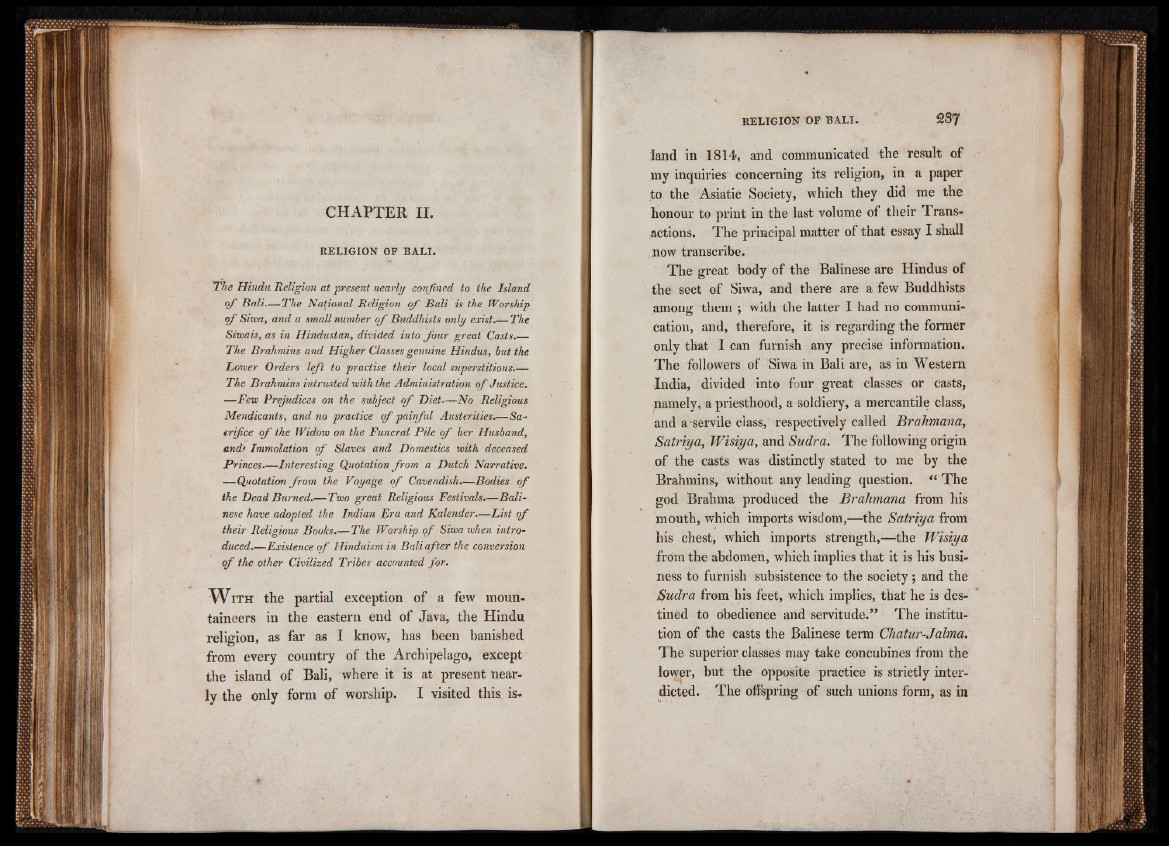
CHAPTER II.
R EL IG IO N OF B A L I.
The Hindu Religion at present nearly confined to the Island
of Bali.—The National Religion of Bali is the Worship
o f Siwa, and a small number o f Buddhists only exist.-—The
Situais, as in Hindustan, divided into four great Casts.—
The Brahmins and Higher Classes genuine Hindus, but the
Lower Orders left to practise their local superstitions.—
The Brahmins intrusted with the Administration of Justice.
—Few Prejudices on the subject of Diet.—No Religious
Mendicants, and no practice of pairful Austerities.— Sacrifice
o f the Widow on the Funeral Pile of her Husband,
and* Immolation of Slaves and Domestics with deceased
Princes.—Interesting Quotation from a Dutch Narrative.
— Quotation from the Voyage of Cavendish.—Bodies of
the Dead Burned.— Two great Religious Festivals— Bali—
nese have adopted the Indian Era and Kalender.-—List of
their Religious Books.— The Worship of Siwa when introduced.—
Existence o f Hinduism in Bali after the conversion
of the other Civilized Tribes accounted for.
" W i t h the partial exception of a few mountaineers
in the eastern end of Java, the Hindu
religion, as far as I know, has been banished
from every country of the Archipelago, except
the island of Bali, where it is at present nearly
the only form of worship. I visited this island
in 1814, and communicated the result of
my inquiries concerning its religion, in a paper
to the Asiatic Society, which they did me the
honour to print in the last volume of their Transactions.
The principal matter of that essay I shall
now transcribe.
The great body of the Balinese are Hindus of
the sect of Siwa, and there are a few Buddhists
among them ; with the latter I had no communication,
and, therefore, it is regarding the former
only that I can furnish any precise information.
The followers of Siwa in Bali are, as in Western
India, divided into four great classes or casts,
namely, a priesthood, a soldiery, a mercantile class,
and a servile class, respectively called Brahmana,
Satriya, Wisiya, and Sudra. The following origin
of the casts was distinctly stated to me by the
Brahmins, without any leading question. “ The
god Brahma produced the Brahmana from his
mouth, which imports wisdom,—the Satriya from
his chest, which imports strength,—the Wisiya
from the abdomen, which implies that it is his business
to furnish subsistence to the society; and the
Sudra from his feet, which implies, that he is destined
to obedience and servitude.” The institution
of the casts the Balinese term Chatur-Jalma.
The superior classes may take concubines from the
lowpr, but the opposite practice is strictly interdicted.
The offspring of such unions form, as in